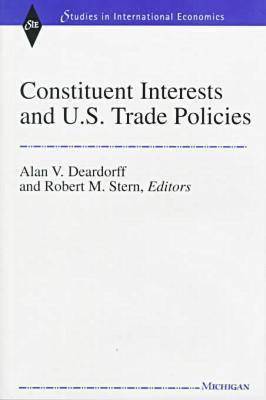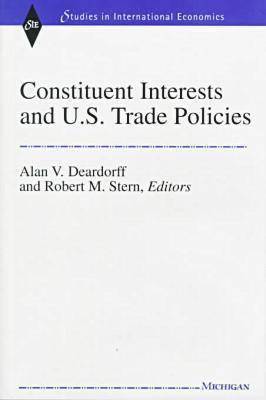
- Afhalen na 1 uur in een winkel met voorraad
- Gratis thuislevering in België vanaf € 30
- Ruim aanbod met 7 miljoen producten
- Afhalen na 1 uur in een winkel met voorraad
- Gratis thuislevering in België vanaf € 30
- Ruim aanbod met 7 miljoen producten
Zoeken
€ 113,45
+ 226 punten
Omschrijving
The contributors to this volume, economists and political scientists from academic institutions, the private sector, and the Ways and Means Committee of the U.S. House of Representatives, came together to discuss an important topic in the formation of U.S. international trade policy: the representation of constituent interests. In the resulting volume they address the objectives of groups who participate in the policy process and examine how each group's interests are identified and promoted. They look at what means are used for these purposes, and the extent to which the groups' objectives and behavior conform to how the political economy of trade policy is treated in the economic and political science literature. Further, they discuss how effective each group has been.
Each of the book's five parts offers a coherent view of important components of the topic. Part I provides an overview of the normative and political economy approaches to the modeling of trade policies. Part 2 discusses the context of U.S. trade policies. Part 3 deals with the role of sectoral producing interests, including the relationship of trade policy to auto, steel, textile, semiconductor, aircraft, and financial services. Part 4 examines other constituent interests, including the environment, human rights, and the media. Part 5 provides commentary on such issues as the challenges that trade policy poses for the new administration and the 105th Congress.
The volume ultimately offers important and more finely articulated questions on how trade policy is formed and implemented.
Contributors are Robert E. Baldwin, Jagdish Bhagwati, Douglas A. Brook, Richard O. Cunningham, Jay Culbert, Alan V. Deardorff, I. M. Destler, Daniel Esty, Geza Feketekuty, Harry Freeman, John D. Greenwald, Gene Grossman, Richard L. Hall, Jutta Hennig, John H. Jackson, James A. Levinsohn, Mustafa Mohatarem, Robert Pahre, Richard C. Porter, Gary R. Saxonhouse, Robert E. Scott, T. N. Srinivasan, Robert M. Stern, Joe Stroud, John Sweetland, Raymond Waldmann, Marina v.N. Whitman, and Bruce Wilson.
Alan V. Deardorff and Robert M. Stern are Professors of Economics and Public Policy, University of Michigan.
Each of the book's five parts offers a coherent view of important components of the topic. Part I provides an overview of the normative and political economy approaches to the modeling of trade policies. Part 2 discusses the context of U.S. trade policies. Part 3 deals with the role of sectoral producing interests, including the relationship of trade policy to auto, steel, textile, semiconductor, aircraft, and financial services. Part 4 examines other constituent interests, including the environment, human rights, and the media. Part 5 provides commentary on such issues as the challenges that trade policy poses for the new administration and the 105th Congress.
The volume ultimately offers important and more finely articulated questions on how trade policy is formed and implemented.
Contributors are Robert E. Baldwin, Jagdish Bhagwati, Douglas A. Brook, Richard O. Cunningham, Jay Culbert, Alan V. Deardorff, I. M. Destler, Daniel Esty, Geza Feketekuty, Harry Freeman, John D. Greenwald, Gene Grossman, Richard L. Hall, Jutta Hennig, John H. Jackson, James A. Levinsohn, Mustafa Mohatarem, Robert Pahre, Richard C. Porter, Gary R. Saxonhouse, Robert E. Scott, T. N. Srinivasan, Robert M. Stern, Joe Stroud, John Sweetland, Raymond Waldmann, Marina v.N. Whitman, and Bruce Wilson.
Alan V. Deardorff and Robert M. Stern are Professors of Economics and Public Policy, University of Michigan.
Specificaties
Betrokkenen
- Auteur(s):
- Uitgeverij:
Inhoud
- Aantal bladzijden:
- 344
- Taal:
- Engels
- Reeks:
Eigenschappen
- Productcode (EAN):
- 9780472109326
- Verschijningsdatum:
- 23/12/1998
- Uitvoering:
- Hardcover
- Formaat:
- Genaaid
- Afmetingen:
- 161 mm x 236 mm
- Gewicht:
- 635 g

Alleen bij Standaard Boekhandel
+ 226 punten op je klantenkaart van Standaard Boekhandel
Beoordelingen
We publiceren alleen reviews die voldoen aan de voorwaarden voor reviews. Bekijk onze voorwaarden voor reviews.











